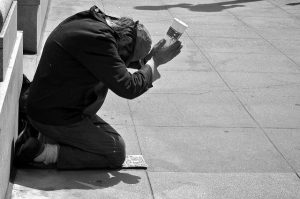 |
| Creative commons photo by Jeremy Brooks |
A few years ago, I had a bit of an epiphany about panhandling that changed how I handled the situation. Before I tell you what it was, allow me to describe how I got there.
(Note: This post has been updated in May 2017 below.)
I always struggled with what to do. I’ve walked with someone to a restaurant and bought him soup. I’ve handed people money. And all too often, I would avoid the person’s gaze, pretend not to hear, and keep walking. This always bothered me. I live in a city, and where there are a lot of people, you see more of every kind of person. I frequently encounter someone asking for money or food. Somehow, just ignoring another human being felt wrong.
I decided I had enough with trying to determine what to do on a case by case basis. One day, I decided to try something new. I would give something to anyone who asked. I could afford it. I am very fortunate. I am well off enough to do something, however small, for every single person I came across who asked me to help. So I did.
I have to say, my life changed after that. I never felt guilty about not helping, because I always did. I never worried about how the person was going to use that money, I just wanted to be kind and generous to others without strings. I actually had kind interactions with people I used to ignore. Almost without fail, the person is truly appreciative. Occasionally, someone is not, but I chalk that up to that person’s own reality that day. I’m not going to punish the nine out of ten people who are genuinely grateful for the one who’s own reality made him or her gruff and unappreciative. Besides, if I were in a position where I felt the need to ask strangers on the street for help, money, or food, I can’t imagine how hard that would be and how I would act.
I shared my findings with others. Sadly, I found that almost everyone I talked to disagreed with my approach. They all had reasons why I was not actually helping that person. How that person was going to use it in a way that would maintain their situation rather than improve it. More often than not, they were either going to use it for alcohol or drugs, or they didn’t really need it and were somehow making good money swindling people playing off their guilt. Only one person I shared it with decided to try it, too. Later he told me he found the same joy I did in this approach.
Then one day, someone close to me who was a healthcare worker scolded me for handing money to people. She said she witnessed first hand what happens to people who get money from strangers, coming to hospitals repeatedly. I strongly reconsidered my approach. Was I actually making things worse? I valued this person’s opinion, and felt maybe I was deceiving myself.
 |
| Creative Commons photo by Republic of Korea |
Then I read this editorial in the New York Times about Pope Francis and his recommended approach to panhandling. Give without worry. I urge you to read this article:
https://www.nytimes.com/2017/
Give them the money, and don’t worry about it…The pope’s advice…is startlingly simple…scripturally sound…the pope said that giving something to someone in need is “always right.”
He even had advice for those who suggest the person will just use it for bad things:
If “a glass of wine is the only happiness he has in life, that’s O.K. Instead, ask yourself, what do you do on the sly? What ‘happiness’ do you seek in secret?” Another way to look at it, he said, is to recognize how you are the “luckier” one, with a home, a spouse and children, and then ask why your responsibility to help should be pushed onto someone else.
Finally, he also validated something I found to be true in my approach as well, about interacting with the person:
He said the way of giving is as important as the gift. You should not simply drop a bill into a cup and walk away. You must stop, look the person in the eyes, and touch his or her hands. The reason is to preserve dignity, to see another person not as a pathology or a social condition, but as a human, with a life whose value is equal to your own.
In these difficult times, when fear of others is being stoked, where there’s increasing worldwide sentiment to focus inward and separate from one another, I find the words of Pope Francis compassionate, desperately needed, and consistent with what I have found to be true. When so much feels out of our control, and it’s easy to feel hopeless about what role we as individuals can take to make the world a better place, what better way to start than in such a personal, human way?
UPDATE May 26, 2017:
Since posting this, I have taken to heart what Pope Francis said in particular about the human connection:
“He said the way of giving is as important as the gift. You should not simply drop a bill into a cup and walk away. You must stop, look the person in the eyes, and touch his or her hands. The reason is to preserve dignity, to see another person not as a pathology or a social condition, but as a human, with a life whose value is equal to your own.”
I have tried to do this at every encounter, and he’s right – what a difference. That handshake changes the dynamic from an awkward solicitation to a conversation between fellow human beings.
Today, I met a woman and her daughter selling candy while I was eating my lunch at a table in the park. She said they had lost everything – her job, house, car – and were living in a shelter, but she was trying to climb her way back the right way. After we talked, I stood up, shook her hand, and wished her well. She was overcome. She said she was honored that I would shake her hand and that it meant a lot to her.
This was only one of several stories like it I could share. Like the warm exchange I had with a man and his son – he also had lost his job in Texas and came to Atlanta to try to find something new.
A handshake. A name. A few seconds of conversation. Simple, yet powerful. My life is richer for it. I highly recommend it.